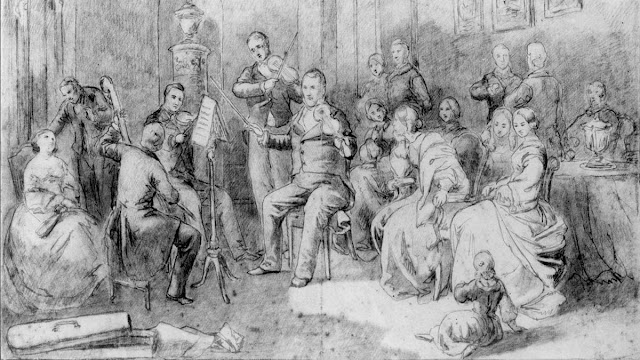 |
| Carl Heinrich Arnold (1793-1874) – String quartet in the Spohr house, c. 1840 CC BY-NC-SA © Internationale Louis Spohr Gesellschaft e.V., Spohr Museum Kassel |
Two years older than Weber, as a violin virtuoso hailed as a “German Paganini”, a pioneer in the use of the conductor’s baton and an important figure in the transition from Classical to Romantic music, Louis Spohr wrote ten symphonies, ten operas, 18 violin concertos and much else besides.
Yet his reputation has never really risen following his death in 1859 when he was seen as a representative of the old order rather than a precursor of the new. The Neue Berliner Musikzeitung called Spohr “the last representative of that noble school whose roots reached deep into classical soil.”
His opera Faust, which is not actually based on Goethe but on Faust plays and poems by Friedrich Maximilian Klinger and Heinrich von Kleist, is an important work in German Romantic opera. It premiered in 1816 in Prague with Weber conducting, five years before Weber’s Der Freischutz, and Meyerbeer conducted it in Berlin the same year. In 1851 Spohr turned it from singspiel into grand opera. Yet for all the work’s importance, when it was staged in Bielefeld in 1993, it was probably the work’s first staging since 1931!
Spohr remains best know for his Nonet, not so much because it is played frequently as because it became iconic, the precursor of many such works by other composers. Spohr’s chamber music was often written for his own performance and there is a significant amount of it, including 36 string quartets!
Now, having explored Brahms’ string quintets and sextets, the WDR Chamber Players (all members of the WDR Sinfonie Orchester) have returned to Pentatone for The Romantic Room: Chamber Works by Louis Spohr. This expansive, six-disc set features Spohr’s four double string quartets, seven string quintets and string sextet. The music spans Spohr’s career, his first quintet dates from 1814 whilst they spread to 1850. His sextet dates from the revolutionary year of 1848, and in a brief note in his personal catalogue he refers to the work as “Written in March and April during the glorious people’s revolution for the revival of Germany’s freedom, unity, and greatness.”
Full details on the Pentatone label. Happy exploring.


.jpg?w=998&resize=998,665&ssl=1)






